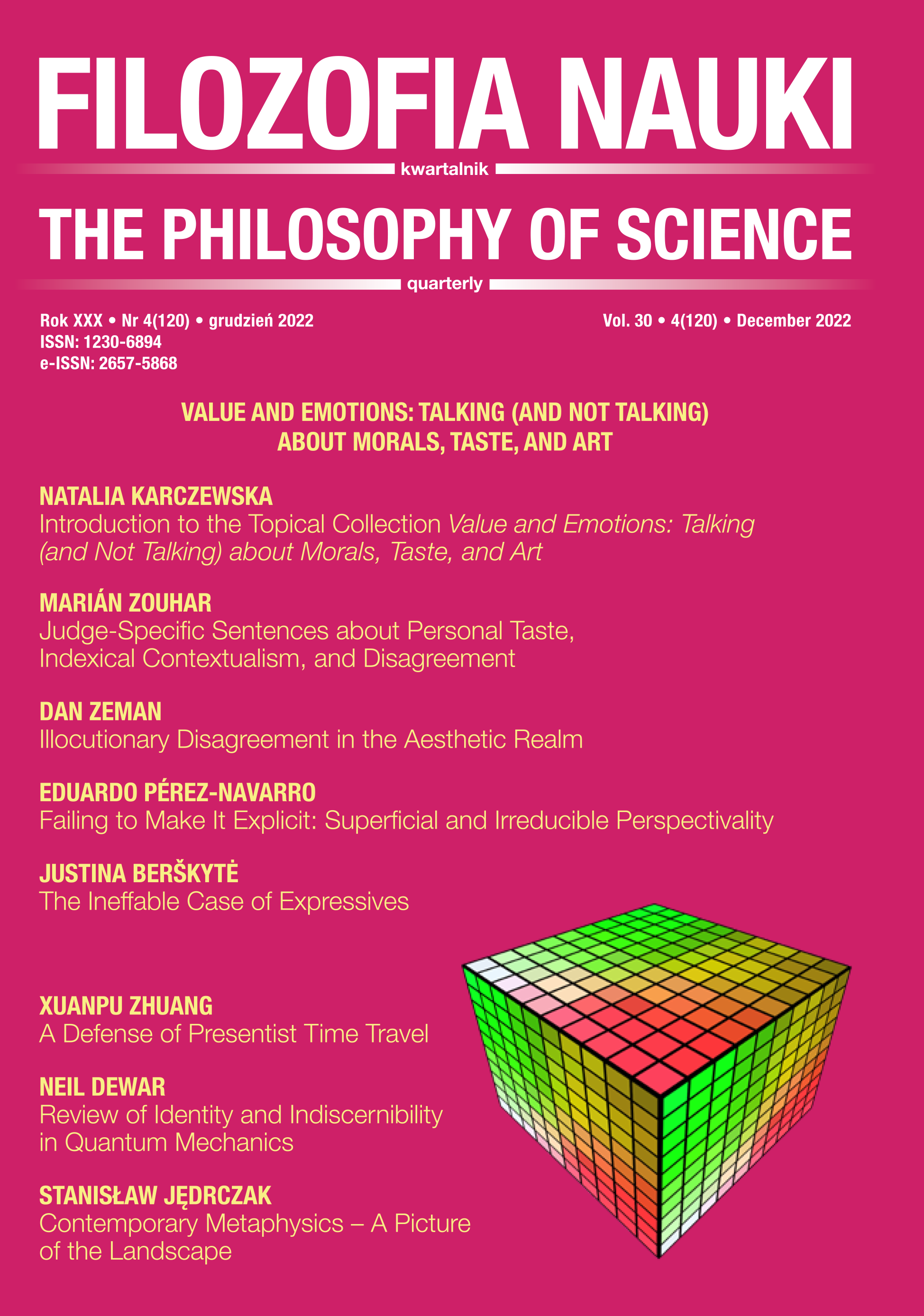A Defense of Presentist Time Travel
DOI:
https://doi.org/10.14394/filnau.2022.0038Keywords:
presentism, time travel, causation, personal identityAbstract
Presentism usually holds that only present entities exist. In contrast to presentism, eternalism holds that past, present, and future entities all exist. According to some philosophers, presentism is intuitively incompatible with time travel. In this paper, I defend the compatibility between presentism and time travel by arguing for a plausible account of causation in the presentist framework. To achieve my goal, I respond to an objection to presentist time travel that is based on the nonexistence of the past: the Causation Objection. According to the Causation Objection, causal relations between objects at different times are necessary for time travel, but these are impossible for presentists. I evaluate a possible reply based on a non-relational account of causation and show that this reply is not satisfying. Subsequently, I put forward a fact-based account of causal relation. I argue that presentists could accept facts instead of events as causal relata, thus establishing causal relations. As all facts about the past, the present, and the future exist in the present, we could explain how backward causation works and describe the discrepancy between personal time and external time in presentist time travel; in this way, I argue, we could vindicate the compatibility between presentism and time travel.
References
Arntzenius F. (2006), “Time Travel: Double Your Fun,” Philosophy Compass 1(6): 599–616. https://doi.org/10.1111/j.1747-9991.2006.00045.x
Bennett J. (1988), Events and Their Names, Indianapolis: Hackett Publishers.
Berstein S. (2015), “The Metaphysics of Omissions,” Philosophy Compass 10(3): 208–218. https://doi.org/10.1111/phc3.12206
Carter W. R. (1989), “How to Change Your Mind,” Canadian Journal of Philosophy 19(1): 1–14. https://doi.org/10.1080/00455091.1989.10716464
Chisholm R. M. (1970), “Events and Propositions,” Noûs 4: 15–24. https://doi.org/10.2307/2214288
Daniels P. R. (2012), “Back to the Present: Defending Presentist Time Travel,” Disputatio 4: 469–484. https://doi.org/10.2478/disp-2012-0012
Davidson D. (1967), “Causal Relations,” Journal of Philosophy 64(21): 691–703. https://doi.org/10.2307/2023853
Deasy D. (2017), “What is Presentism?,” Noûs 51(2): 378–397. https://doi.org/10.1111/nous.12109
Dowe P. (2000), “The Case for Time Travel,” Philosophy 75: 441–451. https://doi.org/10.1017/S0031819100000504
Dowe P. (2001), “A Counterfactual Theory of Prevention and ‘Causation’ by Omission,” Australasian Journal of Philosophy 79(2): 216–226. https://doi.org/10.1080/713659223
Godfrey-Smith W. (1980), “Travelling in Time,” Analysis 40: 72–73. https://doi.org/10.1093/analys/40.2.72
Goldman A. I. (1970), A Theory of Human Action, New York: Prentice-Hall.
Grey W. (1999), “Troubles with Time Travel,” Philosophy 74: 55–70. https://doi.org/10.1017/S0031819199001047
Hales S. D. (2010), “No Time Travel for Presentists,” Logos & Episteme 1: 353–360. https://doi.org/10.5840/logos-episteme2010129
Hales S. D. (2011), “Reply to Licon on Time Travel,” Logos & Episteme 2(4): 633–636. https://doi.org/10.5840/logos-episteme20112412
Hall N. (2004), “Two Concepts of Causation” [in:] Causation and Counterfactuals, J. Collins, N. Hall, L. Paul (eds.), Cambridge: MIT Press, 225–276.
Hall T. (2014), “In Defense of the Compossibility of Presentism and Time Travel,” Logos & Episteme 2: 141–159. https://doi.org/10.5840/logos-episteme20145213
Hendrickson N. (2006), “Towards a More Plausible Exemplification Theory of Events,” Philosophical Studies 129(2): 349–375. https://doi.org/10.1007/s11098-004-1647–9
Hitchcock Ch. (2007), “Three Concepts of Causation,” Philosophy Compass 2(3): 508–516. https://doi.org/10.1111/j.1747-9991.2007.00084.x
Keller S., Nelson M. (2001), “Presentists Should Believe in Time-Travel,” Australasian Journal of Philosophy 79: 333–345. https://doi.org/10.1080/713931204
Kim J. (1966), “On the Psycho-Physical Identity Theory,” American Philosophical Quarterly 3(3): 227–235.
Kim J. (1976), “Events as Property Exemplifications” [in:] Action Theory, M. Brand, D. Walton (eds.), Dordrecht: Reidel, 159–177. https://doi.org/10.1007/978-94-010-9074-2_9
Lewis D. (1973), “Causation,” Journal of Philosophy 70(17): 556–567. https://doi.org/10.2307/2025310
Lewis D. (1976), “The Paradoxes of Time Travel,” American Philosophical Quarterly 13: 145–152.
Lewis D. (1983), “Survival and Identity” [in:] Philosophical Papers, Vol. I, Oxford: Oxford University Press.
Licon J. A. (2011), “No Suicide for Presentists: A Response to Hales,” Logos & Episteme 2(3): 455–464. https://doi.org/10.5840/logos-episteme20112325
Licon J. A. (2012), “Still No Suicide for Presentists: Why Hales’ Response Fails,” Logos & Episteme 1: 149–155. https://doi.org/10.5840/logos-episteme20123157
Mackie D. (1999), “Personal Identity and Dead People,” Philosophical Studies 95(3): 219–242. https://doi.org/10.1023/A:1004239225105
Markosian N. (2009), “The Truth About the Past and the Future” [in:] Around the Tree: Semantic and Metaphysical Issues Concerning Branching and the Open Future, F. Correia, A. Iacona (eds.), Synthese Library, 127–141. https://doi.org/10.1007/978-94-007-5167-5_8
Mellor D. H. (1995), The Facts of Causation, London: Routledge Press. https://doi.org/10.4324/9780203302682
Menzies P. (1989), “A Unified Account of Causal Relata,” Australasian Journal of Philosophy 67(1): 59–83. https://doi.org/10.1080/00048408912343681
Miller K. (2005), “Time Travel and the Open Future,” Disputatio 1(19): 223–232. https://doi.org/10.2478/disp-2005-0009
Miller K. (2008), “Backwards Causation, Time, and the Open Future,” Metaphysica 9: 173–191. https://doi.org/10.1007/s12133-008-0030-2
Monton B. (2003), “Presentists Can Believe in Closed Timelike Curves,” Analysis 63: 199–202. https://doi.org/10.1093/analys/63.3.199
Nagel T. (1986), The View from Nowhere, New York: Oxford University Press.
Norton J. (2018), “If Time Travel to Our Location Is Possible, We Do Not Live in a Branching Universe,” Analysis 78(2): 260–266. https://doi.org/10.1093/analys/anx149
Nozick R. (1981), Philosophical Explanations, Cambridge: Harvard University Press.
Olson E. (1997), The Human Animal: Personal Identity without Psychology, New York: Oxford University Press.
Parfit D. (1971), “Personal Identity,” Philosophical Review 80: 3–27. https://doi.org/10.2307/2184309
Parfit D. (1984), Reasons and Persons, Oxford: Oxford University Press.
Pearl J. (2000), Causality: Models, Reasoning and Inference, New York: Cambridge University Press.
Pensgard D. (2001), “Presentist Time Travel and the Limits of Presentist Causality,” Philosophy 79(3): 333–345.
Sider T. (2005), “Traveling in A- and B- Time,” Monist (Special Issue on Time Travel) 88: 329–335. https://doi.org/10.5840/monist200588326
Sosa E., Tooley M. (eds.) (1993), Causation, New York: Oxford University Press.
Tooley M. (1990), “Causation: Reductionism versus Realism,” Philosophy and Phenomenological Research 50: 215–236. https://doi.org/10.2307/2108040
van Inwagen P. (1990), Material Beings, Ithaca: Cornell University Press.
Vendler Z. (1967), “Causal Relations,” Journal of Philosophy 64(21): 704–713. https://doi.org/10.2307/2023854
Downloads
Published
How to Cite
Issue
Section
License
Copyright (c) 2022 Xuanpu Zhuang

This work is licensed under a Creative Commons Attribution-NonCommercial-NoDerivatives 4.0 International License.



















 Filozofia Nauki/The Philosophy of Science | ISSN 1230-6894 | e-ISSN 2657-5868
Filozofia Nauki/The Philosophy of Science | ISSN 1230-6894 | e-ISSN 2657-5868